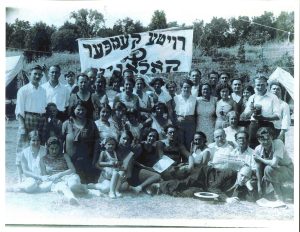 It is a measure of the pervasiveness of the Internet that the dean of an Orthodox religious school measures the school’s influence and success – at least in part – by the number of page downloads from its website recorded every day.
It is a measure of the pervasiveness of the Internet that the dean of an Orthodox religious school measures the school’s influence and success – at least in part – by the number of page downloads from its website recorded every day.
Rabbi Yosef Carmel, right, smiles when he says that 1,000 people visit the Eretz Hemdah website (www.eretzhemdah.org)
daily to retrieve a document to help them lead a more traditional
lifestyle. They’re not just casual visitors, he explains, but people
who navigate the site in search of a weekly dvar Torah, advice on
Halachah, information about the school’s philosophy or any of its
dozens of rabbinic courts’ decisions on matters of Jewish law.
The material is available in Hebrew, with much of it translated into English, said Rabbi Carmel, who was in Toronto last week to promote the school’s good works. He met supporters of the yeshiva at a private home in an event sponsored by Mizrachi Canada.
Eretz Hemdah is an educational institution based in Jerusalem that offers a highly intensive program of Torah study for rabbinic students and those who already possess smichah (rabbinic ordination). It offers a PhD-level program of study for post-smichah students leading to the advanced yadin yadin certification.
“This is the highest level of Torah learning in Israel and abroad,” said Rabbi Carmel, one of the school’s founders.
Eretz Hemdah also operates an Orthodox beit din (rabbinic court) with 18 branches across Israel. In addition to batei din in Jerusalem, Tel Aviv and Haifa, 15 other courts have adopted Eretz Hemdah’s system of dispute resolution and are called upon by Israelis to arbitrates all manners of disputes, such as business conflicts, he said.
Eretz Hemdah’s court system operates in parallel to one offered within the haredi community and the country’s civil courts. Participants volunteer to be bound by the court’s decisions, which are enforceable by secular authorities, he said.
The two-year-old batei din hear about 250 cases per year and apply not just halachic principals but those of Israeli and international law, Rabbi Carmel said.
In rendering its decisions and in training its students, Eretz Hemdah operates under a principle of making Jewish law as accessible to as many Jews as possible.
“We want to bring Torah with love,” he said.
Rabbi Carmel distinguished the approach of Eretz Hemdah-trained rabbis from other halachic judges: “Sometimes the atmosphere is to go all the way to the right. We are trying to say that if you want to give halachic decision to the majority of the nation, you must take halachic decisions all the way to the middle. We want to bridge the gaps between the Jewish people and use Halachah to do it.”
He said he disagreed with a decision of the Orthodox rabbinate in Israel, and applied in North America, that ruled adopted children could be converted only if their parents are Torah-observant Jews.
His institute favours a more liberal policy that would permit conversions if parents agreed to bring up their children as Jews and there was a good chance the child would observe mitzvot when he or she grows up, he said.
Too many faiths are opting for “harsh interpretations. It’s a big mistake,” he said
They are doing so “to defend themselves.”
But, “if you have self confidence, knowledge, you don’t need to protect yourself in such a way of building walls around you,” he added.
As for the Jewish people, “It’s a pity so many in Judaism are too far from our tradition. They see Judaism as making life tough. But the truth is, you enjoy life more when you are connected to your roots,” Rabbi Carmel said.






